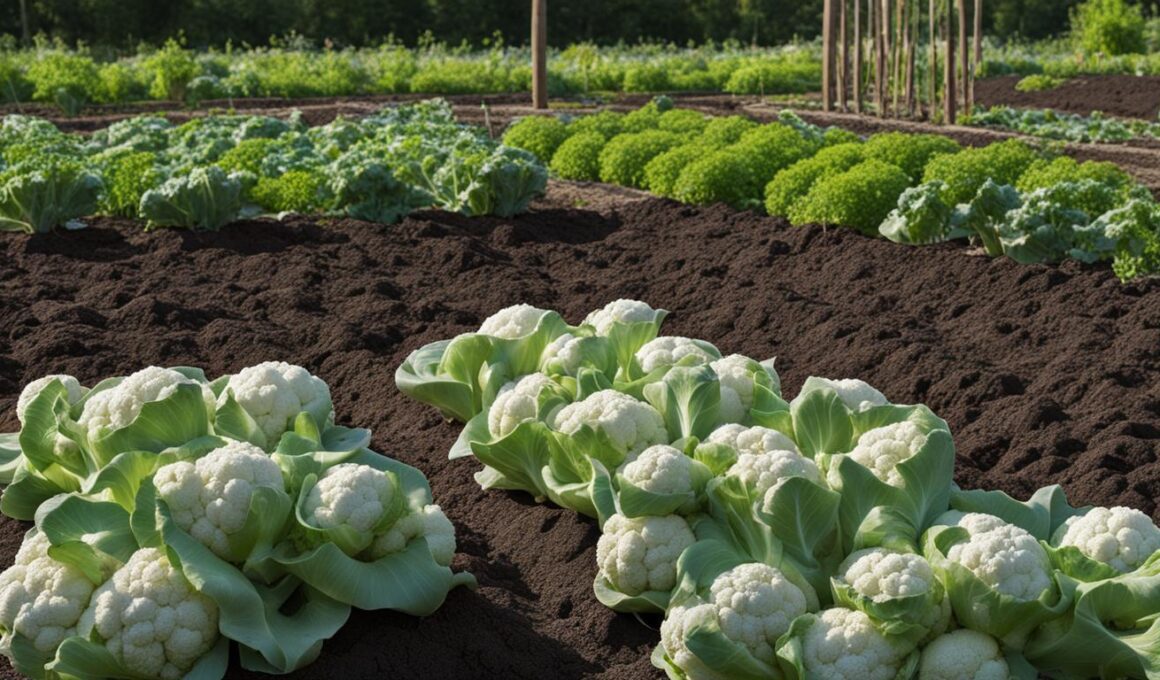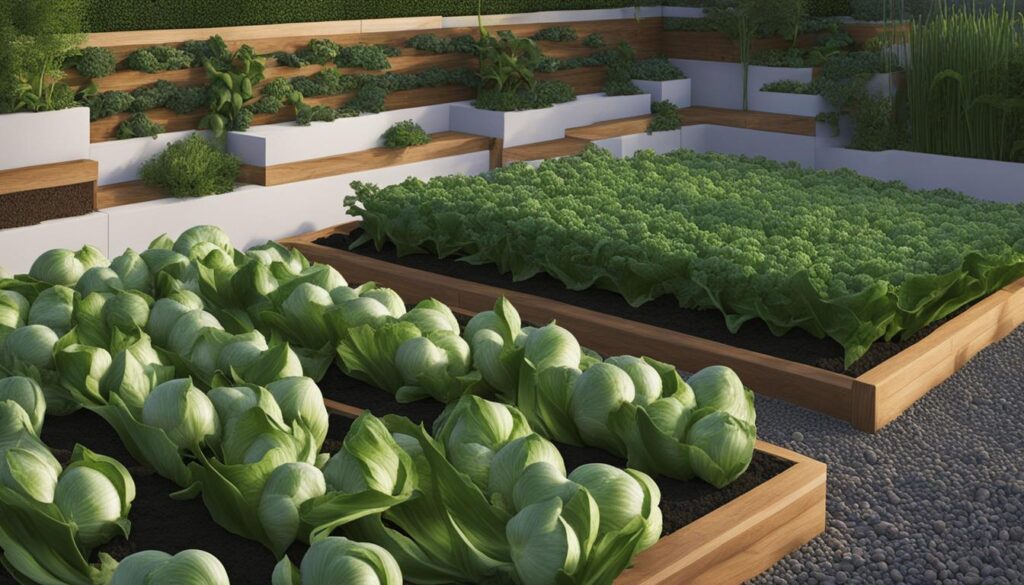Companion planting is a gardening technique that pairs different plants together for mutual benefits. When it comes to growing onions and cauliflower together, there are several companion plants that can help both thrive. According to the sources, beans, celery, and onions are excellent choices when companion planting cauliflower. These plants deter pests and attract beneficial insects, creating a healthy growing environment for both onions and cauliflower. Additionally, some herbs like sage and thyme can also benefit cauliflower by repelling pests and attracting pollinators.
Post Summary:
- Growing onions and cauliflower together using companion planting techniques can benefit both crops.
- Beans, celery, and onions are recommended companion plants for cauliflower.
- Herbs like sage and thyme can also provide benefits to cauliflower by repelling pests and attracting pollinators.
- Companion planting creates a harmonious environment that promotes healthy growth and deters pests.
- Experiment with different companion plantings to find what works best for your garden.
What is Companion Planting?
Companion planting is a gardening technique that involves growing two or more plant varieties together for their mutual benefit. It is a practice that has been used for centuries, drawing inspiration from the symbiotic relationships observed in nature. By strategically planting compatible crops, gardeners can create a harmonious environment that promotes healthier and more productive plants.
The benefits of companion planting are numerous. Firstly, it helps deter pests naturally. Certain companion plants repel or confuse pests, reducing the likelihood of infestations and minimizing the need for chemical pesticides. Additionally, some plants attract beneficial insects that prey on pests, further improving pest control in the garden.
Companion planting also improves soil fertility and nutrient availability. Some plants have deep root systems that can bring up nutrients from lower soil layers, benefiting nearby shallow-rooted plants. Furthermore, certain plants have the ability to fix nitrogen in the soil, enriching it and providing a vital nutrient for surrounding plants.
“Companion planting is like creating a mini ecosystem in your garden. It encourages biodiversity, which leads to a more resilient and sustainable growing environment.” – Gardening expert
Overall, companion planting is a holistic and eco-friendly gardening practice that offers a range of benefits. It promotes natural pest control, boosts soil fertility, and fosters biodiversity in the garden. By incorporating companion planting techniques into your gardening practices, you can create a thriving and balanced ecosystem that supports the growth and health of your plants.
Popular Companion Plants for Cauliflower
When it comes to companion planting for cauliflower, there are several popular choices that can help enhance its growth and protect it from pests. Pairing cauliflower with the right companions not only creates a healthier growing environment but also improves the overall productivity of your garden. Some popular companion plants for cauliflower include:
Beans and Cauliflower
Beans are excellent companion plants for cauliflower. They help deter pests like aphids and cabbage loopers, which can damage cauliflower leaves. Additionally, beans attract beneficial insects such as ladybugs and lacewings that prey on common cauliflower pests.
Celery and Cauliflower
Celery is another great companion plant for cauliflower. Its water-hogging nature can help retain moisture in the soil, benefiting cauliflower, which requires consistent watering. Celery also helps improve soil fertility, creating a nutrient-rich environment for cauliflower to thrive.
Onions and Cauliflower
Onions make excellent companions for cauliflower as they repel major brassica pests, including cabbage loopers and aphids. By planting onions alongside cauliflower, you can help protect it from these destructive insects and create a pest-free growing environment.
By incorporating these companion plants into your garden, you can create a thriving ecosystem that promotes the growth and health of both onions and cauliflower. Remember to provide adequate space and ensure proper watering and maintenance for each plant to optimize their benefits as companion plants.
Other Recommended Companion Plants for Cauliflower
In addition to the popular companion plants mentioned earlier, there are other recommended companion plants for cauliflower. Herbs like sage and thyme have strong scents that deter pests and attract bees, benefitting cauliflower. However, it’s important to avoid planting peas near cauliflower, as peas can stunt the growth of cauliflower. Additionally, strawberries and tomatoes are not recommended for companion planting with cauliflower, as they have different nutrient requirements that may hinder cauliflower growth.
Companion Plants for Cauliflower
When it comes to companion planting with cauliflower, there are a few additional options to consider. Sage and thyme, both aromatic herbs, can help repel pests and attract pollinators, benefiting cauliflower’s growth and overall health. These herbs have strong scents that mask the scent of the cauliflower, making it less attractive to pests like cabbage worms and aphids. Similarly, the pungent scent of onions can also help deter pests from attacking cauliflower.
On the other hand, it’s important to avoid planting peas near cauliflower. Peas have a tendency to climb and can twine around the cauliflower, potentially causing damage or stunting its growth. Additionally, strawberries and tomatoes have different nutrient requirements compared to cauliflower, and growing them together may result in nutrient imbalances that can hinder cauliflower’s growth and development.
Companion Planting Guidelines
When choosing companion plants for cauliflower, it’s important to consider their compatibility in terms of nutrient needs, growth habits, and pest and disease resistance. Some plants have specific requirements or characteristics that may not be beneficial to cauliflower. However, by selecting the right companion plants, you can create a thriving garden ecosystem that supports the growth and health of your cauliflower.
| Companion Plant | Benefits for Cauliflower |
|---|---|
| Sage | Deters pests and attracts pollinators |
| Thyme | Repels pests and attracts pollinators |
| Onions | Repels major brassica pests like cabbage loopers and aphids |
| Peas | Avoid planting near cauliflower as they can stunt its growth |
| Strawberries | Not recommended as they have different nutrient requirements |
| Tomatoes | Not recommended as they have different nutrient requirements |
Utilizing Space with Cauliflower and Other Plants
Growing cauliflower in your garden can sometimes take up a lot of space, but there are ways to make the most of your garden area by combining cauliflower with other compatible plants. By utilizing companion planting techniques, you can create a productive and harmonious growing environment while maximizing space.
One way to utilize space effectively is by interplanting cauliflower with crops that have different root systems. Cauliflower leaves provide shade and protection for crops like potatoes and beets, which have deeper root systems. This allows you to grow multiple vegetables in the same area without competing for resources.
In addition to interplanting, you can also consider planting cauliflower alongside vertically growing plants like trellised cucumbers or pole beans. This takes advantage of the vertical space in your garden and allows cauliflower to benefit from the support provided by these plants. Just make sure the taller plants won’t shade the cauliflower too much.
When planning your garden layout, it’s important to consider the different nutrient and water requirements of companion plants. Some plants may have higher water needs or prefer different soil conditions, so be mindful of these factors when deciding which plants to grow together. Doing some research or consulting gardening resources can help you ensure compatibility and optimize the use of space in your garden.
The Benefits of Companion Planting for Cauliflower
Companion planting offers numerous benefits for cauliflower cultivation. By strategically pairing cauliflower with compatible companion plants, you can effectively reduce pests, enhance growth, and even improve flavor. These advantages make companion planting an essential technique for successful cauliflower gardening.
One of the key benefits of companion planting for cauliflower is the reduction of pests. When planted alongside companion plants that have natural pest-repelling properties, such as onions, cauliflower can be protected from destructive insects like cabbage loopers and slugs. This helps to maintain the health and vitality of the cauliflower crop, resulting in higher yields and improved quality.
In addition to pest control, companion plants can also enhance the growth of cauliflower. Certain companions, like beans and celery, create a favorable environment that promotes healthy growth for cauliflower. Beans, for example, help to deter pests and attract beneficial insects, while celery aids in conserving soil moisture and retaining nutrients. These factors contribute to increased vigor and productivity in the cauliflower plants.
Furthermore, companion planting can even improve the flavor of cauliflower. Some companion plants, such as herbs like sage and thyme, have strong scents that can enhance the taste of cauliflower when grown together. This flavor enhancement adds an extra layer of enjoyment to the harvesting and consumption of the cauliflower crop.
In summary, companion planting provides numerous benefits for cauliflower cultivation. By reducing pests, enhancing growth, and improving flavor, companion plants contribute to the overall success and satisfaction of cauliflower gardening. Utilizing companion planting techniques can help you maximize the potential of your cauliflower crop and create a thriving garden ecosystem.
| Companion Plants | Benefit |
|---|---|
| Onions | Repel pests, such as cabbage loopers and aphids |
| Beans | Deter pests and attract beneficial insects |
| Celery | Conserves soil moisture and retains nutrients |
| Sage | Enhances flavor and repels pests |
| Thyme | Enhances flavor and attracts pollinators |
With the right companion plants by its side, cauliflower can thrive in your garden. Consider incorporating these companion plants and enjoy the benefits they bring to your cauliflower crop.
Conclusion
In conclusion, growing onions and cauliflower together through companion planting is a wise gardening practice. By strategically selecting companion plants and understanding their specific benefits, you can create a thriving environment for both crops, promoting pest control and enhancing growth.
Key takeaways from this article include:
- Pest deterrence: Companion plants like beans, celery, onions, sage, and thyme can help repel harmful insects and attract beneficial ones, reducing the risk of pests in your onions and cauliflower.
- Enhanced growth: Through companion planting, cauliflower can enjoy shade, soil moisture preservation, and improved soil fertility, leading to healthier and more robust growth.
- Improved flavor: Some companion plants have the ability to enhance the flavor of cauliflower, making it even more delicious when it’s time to harvest and enjoy your homegrown produce.
Remember, finding the perfect companion plants for your onions and cauliflower may require some experimentation. Consider the recommendations provided in this article, and don’t hesitate to explore other companion planting options that suit your garden. With careful planning and proper care, you can experience the benefits of growing onions and cauliflower together while maximizing the productivity of your garden. Happy gardening!
FAQ
What is companion planting?
Companion planting is the practice of growing two or more plant varieties together for their mutual benefit. It enhances plant growth, deters pests, attracts beneficial insects, and improves biodiversity in the garden.
What are some popular companion plants for cauliflower?
Beans, celery, and onions are excellent companion plants for cauliflower. Beans deter pests and attract beneficial insects, celery helps retain nutrients in the soil, and onions repel major brassica pests like cabbage loopers and aphids.
Are there any other recommended companion plants for cauliflower?
Yes, herbs like sage and thyme have strong scents that deter pests and attract bees, benefiting cauliflower. However, peas and cauliflower should not be planted together, as peas can stunt the growth of cauliflower. Strawberries and tomatoes are also not recommended as they have different nutrient requirements.
How can I utilize space when growing cauliflower with other plants?
Cauliflower leaves can provide shade and protection for crops like potatoes and beets, which have deeper root systems. This allows you to maximize the use of garden space and create a harmonious growing environment.
What are the benefits of companion planting for cauliflower?
Companion planting reduces the risk of destructive insects, enhances the growth of cauliflower, and can even improve its flavor. It provides a healthy and productive growing environment for your onions and cauliflower.











